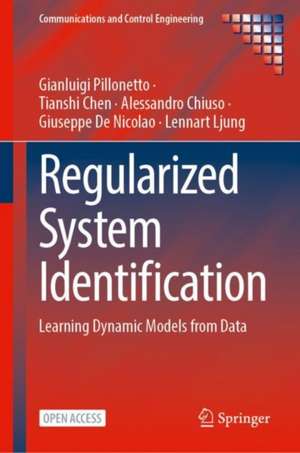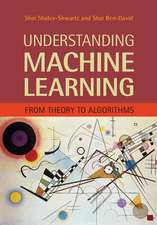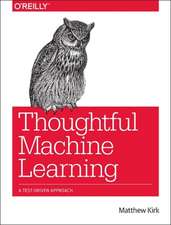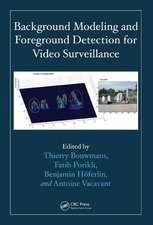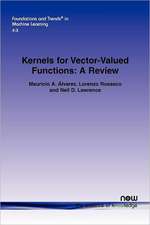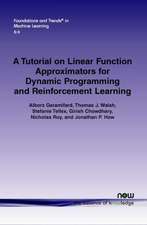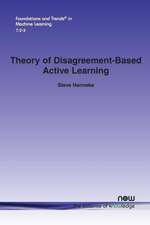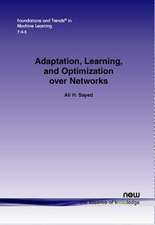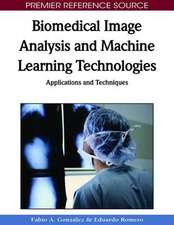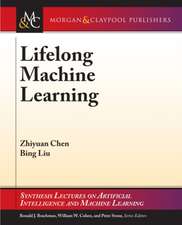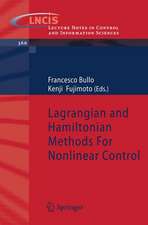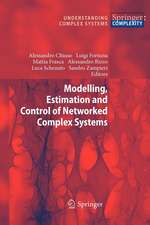Regularized System Identification: Learning Dynamic Models from Data: Communications and Control Engineering
Autor Gianluigi Pillonetto, Tianshi Chen, Alessandro Chiuso, Giuseppe De Nicolao, Lennart Ljungen Limba Engleză Paperback – 14 mai 2022
The challenges it addresses lie at the intersection of several disciplines so Regularized System Identification will be of interest to a variety of researchers and practitioners in the areas of control systems, machine learning, statistics, and data science. This is an open access book.
| Toate formatele și edițiile | Preț | Express |
|---|---|---|
| Paperback (1) | 309.19 lei 6-8 săpt. | |
| Springer International Publishing – 14 mai 2022 | 309.19 lei 6-8 săpt. | |
| Hardback (1) | 341.54 lei 38-45 zile | |
| Springer International Publishing – 14 mai 2022 | 341.54 lei 38-45 zile |
Din seria Communications and Control Engineering
- 15%
 Preț: 659.70 lei
Preț: 659.70 lei - 20%
 Preț: 879.74 lei
Preț: 879.74 lei - 18%
 Preț: 953.65 lei
Preț: 953.65 lei - 18%
 Preț: 1117.03 lei
Preț: 1117.03 lei - 9%
 Preț: 1385.77 lei
Preț: 1385.77 lei - 18%
 Preț: 1128.08 lei
Preț: 1128.08 lei - 18%
 Preț: 953.65 lei
Preț: 953.65 lei - 15%
 Preț: 656.89 lei
Preț: 656.89 lei - 18%
 Preț: 896.52 lei
Preț: 896.52 lei - 18%
 Preț: 1113.26 lei
Preț: 1113.26 lei - 18%
 Preț: 1388.22 lei
Preț: 1388.22 lei - 15%
 Preț: 647.27 lei
Preț: 647.27 lei - 18%
 Preț: 954.45 lei
Preț: 954.45 lei - 18%
 Preț: 1231.47 lei
Preț: 1231.47 lei - 18%
 Preț: 948.92 lei
Preț: 948.92 lei - 18%
 Preț: 1232.57 lei
Preț: 1232.57 lei - 18%
 Preț: 1127.28 lei
Preț: 1127.28 lei - 15%
 Preț: 643.34 lei
Preț: 643.34 lei - 18%
 Preț: 1401.30 lei
Preț: 1401.30 lei - 15%
 Preț: 651.51 lei
Preț: 651.51 lei - 20%
 Preț: 1454.07 lei
Preț: 1454.07 lei - 18%
 Preț: 948.79 lei
Preț: 948.79 lei - 18%
 Preț: 1233.06 lei
Preț: 1233.06 lei - 18%
 Preț: 947.85 lei
Preț: 947.85 lei - 18%
 Preț: 950.96 lei
Preț: 950.96 lei - 18%
 Preț: 956.99 lei
Preț: 956.99 lei - 15%
 Preț: 644.18 lei
Preț: 644.18 lei - 18%
 Preț: 946.87 lei
Preț: 946.87 lei - 18%
 Preț: 951.14 lei
Preț: 951.14 lei - 18%
 Preț: 961.55 lei
Preț: 961.55 lei - 15%
 Preț: 644.18 lei
Preț: 644.18 lei - 20%
 Preț: 990.80 lei
Preț: 990.80 lei - 18%
 Preț: 1006.72 lei
Preț: 1006.72 lei - 18%
 Preț: 942.44 lei
Preț: 942.44 lei - 18%
 Preț: 1233.06 lei
Preț: 1233.06 lei - 15%
 Preț: 641.85 lei
Preț: 641.85 lei - 18%
 Preț: 957.75 lei
Preț: 957.75 lei - 15%
 Preț: 649.87 lei
Preț: 649.87 lei - 18%
 Preț: 958.07 lei
Preț: 958.07 lei - 18%
 Preț: 1117.99 lei
Preț: 1117.99 lei - 18%
 Preț: 1395.94 lei
Preț: 1395.94 lei - 18%
 Preț: 781.62 lei
Preț: 781.62 lei - 18%
 Preț: 953.20 lei
Preț: 953.20 lei - 18%
 Preț: 1109.78 lei
Preț: 1109.78 lei
Preț: 309.19 lei
Preț vechi: 386.49 lei
-20% Nou
Puncte Express: 464
Preț estimativ în valută:
59.17€ • 63.27$ • 49.33£
59.17€ • 63.27$ • 49.33£
Carte tipărită la comandă
Livrare economică 18 aprilie-02 mai
Preluare comenzi: 021 569.72.76
Specificații
ISBN-13: 9783030958626
ISBN-10: 3030958620
Pagini: 377
Ilustrații: XXIV, 377 p. 85 illus., 73 illus. in color.
Dimensiuni: 155 x 235 x 28 mm
Greutate: 0.56 kg
Ediția:1st ed. 2022
Editura: Springer International Publishing
Colecția Springer
Seria Communications and Control Engineering
Locul publicării:Cham, Switzerland
ISBN-10: 3030958620
Pagini: 377
Ilustrații: XXIV, 377 p. 85 illus., 73 illus. in color.
Dimensiuni: 155 x 235 x 28 mm
Greutate: 0.56 kg
Ediția:1st ed. 2022
Editura: Springer International Publishing
Colecția Springer
Seria Communications and Control Engineering
Locul publicării:Cham, Switzerland
Cuprins
Chapter 1. Bias.- Chapter 2. Classical System Identification.- Chapter 3. Regularization of Linear Regression Models.- Chapter 4. Bayesian Interpretation of Regularization.- Chapter 5. Regularization for Linear System Identification.- Chapter 6. Regularization in Reproducing Kernel Hilbert Spaces.- Chapter 7. Regularization in Reproducing Kernel Hilbert Spaces for Linear System Identification.- Chapter 8. Regularization for Nonlinear System Identification.- Chapter 9. Numerical Experiments and Real-World Cases.
Notă biografică
Gianluigi Pillonetto received the Doctoral degree in Computer Science Engineering cum laude from the University of Padova in 1998 and the PhD degree in Bioengineering from the Polytechnic of Milan in 2002. He is currently a Full Professor of Control and Dynamic Systems at the Department of Information Engineering, University of Padova. His research interests are in the field of system identification and machine learning. He has published around 80 papers on these research subjects in peer-reviewed international journals, 100 in conference proceedings and two books. From 2014 to 2016 he was Associate Editor of Systems & Control Letters and IEEE Transactions on Automatic Control. He currently serves as Associate Editor for Automatica. He was Principal Investigator and National Coordinator of a PRIN project funded by the Italian Research Ministry in 2015. In 2003 he received the Paolo Durst award for the best Italian Ph.D. thesis in Bioengineering, hewas the 2017 recipient of the Automatica Prize, assigned every three years for outstanding contributions to control theory by the International Federation of Automatic Control (IFAC) and Automatica (Elsevier). He was Plenary Speaker at System Identification IFAC Symposium 2018 and Editor for the System Identification IFAC Symposium 2021. He was elevated to IEEE Fellow in 2020 for contributions to System Identification.
Tianshi Chen received his Bachelor and Master degree both from The Harbin Institute of Technology in 2001 and 2005, respectively. He received his Ph.D. degree in Automation and Computer-Aided Engineering from The Chinese University of Hong Kong in December 2008. From April 2009 to December 2015, he was working in the Division of Automatic Control, Department of Electrical Engineering, Linköping University, Linköping, Sweden, first as a Postdoc (April 2009–March 2011) and then as an Assistant Professor (April 2011–December 2015). In May 2015, he received the Youth Talents Award of the Thousand Talents Plan of China, and in December 2015, he returned to China and joined the Chinese University of Hong Kong, Shenzhen, as an Associate Professor. He has been mainly working in the area of systems and control with focus on system identification and its applications. He has participated in several projects in Sweden, Europe and China. He is an associate editor for Automatica (2017–present), and also served as an associate editor for Systems & Control Letters (2017–2020), and IEEE Control System Society Conference Editorial Board (2016–2019). He was a plenary speaker at the 19th IFAC Symposium on System Identification, Padova, Italy, July 13-16, 2021.
Alessandro Chiuso is Professor with the Department of Information Engineering, University of Padova. He received the PhD degree in Systems Engineering from the University of Bologna in 2000 and the Laurea (summa cum laude) in Telecommunication Engineering from the University of Padova in 1996. He has published around 40 journal papers and over 90 conference papers. Prof. Chiuso is a FIEEE and chair of the IFAC Technical Committee on Modeling, Identification and Signal Processing, an Associate Editor of the European Journal of Control and of Mathematics of Control, Signals, and Systems. He has been an Associate editor of IEEE Transactions on Control Systems Technology, Automatica (Certificate of Outstanding Service), IEEE Transactions on Automatic Control, the IEEE Conference Editorial Board and a member of the editorial board of IET Control Theory and Application. He has been general chair of the 19th IFAC Symposium on System Identification (2021) and also serves or has served as a member of numerous conference program committees. He has been PI or co-PI of research grants awarded by the Italian Ministery of Higher Education.
Giuseppe De Nicolao joined the University of Pavia in 1992 as Associate Professor. There he became full professor of Systems and Control Engineering in 2000 and, since 2020, Director of the University's Doctoral School. He has authored and coauthored more than 150 articles published in peer-reviewed scientific journals. Among the topics covered: system identification, periodic systems, model predictive control, machine learning, modelling and control of biomedical systems, pharmacometrics, artificial pancreas, advanced process control applied to semiconductor manufacturing. He served on the editorial boards of the IEEE Transactions on Automatic Control, IEEE Transactions on Control Systems Technology, and Automatica. He has been team leader of the Pavia unit in projects funded by state agencies and the European Union, as well in numerous industry-funded projects. He is coinventor in international patents on the analysis of pharmacokinetic-pharmacodynamic data and glucose control for the artificial pancreas.
Lennart Ljung received his PhD in Automatic Control from Lund Institute of Technology in 1974. Since 1976 he has been Professor of the chair of Automatic Control In Linkoping, Sweden. He has held visiting positions at Stanford and MIT and has written several books on system identification and estimation. He is an IEEE Fellow, an IFAC Fellow and an IFAC Advisor. He is a member of the Royal Swedish Academy of Sciences (KVA), a member of the Royal Swedish Academy of Engineering Sciences (IVA), an Honorary Member of the Hungarian Academy of Engineering, an Honorary Professor of the Chinese Academy of Mathematics and Systems Science, and a Foreign Member of the US National Academy of Engineering (NAE). He has received honorary doctorates from the Baltic State Technical University in St Petersburg, from Uppsala University, Sweden, from the Technical University of Troyes, France, from the Catholic University of Leuven, Belgium and from Helsinki University of Technology, Finland. He has received both the Quazza Medal (2002) and the Nichols Medal (2017) from IFAC. In 2003 he received the Hendrik W. Bode Lecture Prize from the IEEE Control Systems Society, and he was the 2007 recipient of the IEEE Control Systems Award. In 2018 he received the Great Gold Medal from the Royal Swedish Academy of Engineering. He is the author of 11 books, some 250 refereed journal papers, about 400 articles in international conferences, as well as a major software package: The System Identification Toolbox (for use with MATLAB).
Tianshi Chen received his Bachelor and Master degree both from The Harbin Institute of Technology in 2001 and 2005, respectively. He received his Ph.D. degree in Automation and Computer-Aided Engineering from The Chinese University of Hong Kong in December 2008. From April 2009 to December 2015, he was working in the Division of Automatic Control, Department of Electrical Engineering, Linköping University, Linköping, Sweden, first as a Postdoc (April 2009–March 2011) and then as an Assistant Professor (April 2011–December 2015). In May 2015, he received the Youth Talents Award of the Thousand Talents Plan of China, and in December 2015, he returned to China and joined the Chinese University of Hong Kong, Shenzhen, as an Associate Professor. He has been mainly working in the area of systems and control with focus on system identification and its applications. He has participated in several projects in Sweden, Europe and China. He is an associate editor for Automatica (2017–present), and also served as an associate editor for Systems & Control Letters (2017–2020), and IEEE Control System Society Conference Editorial Board (2016–2019). He was a plenary speaker at the 19th IFAC Symposium on System Identification, Padova, Italy, July 13-16, 2021.
Alessandro Chiuso is Professor with the Department of Information Engineering, University of Padova. He received the PhD degree in Systems Engineering from the University of Bologna in 2000 and the Laurea (summa cum laude) in Telecommunication Engineering from the University of Padova in 1996. He has published around 40 journal papers and over 90 conference papers. Prof. Chiuso is a FIEEE and chair of the IFAC Technical Committee on Modeling, Identification and Signal Processing, an Associate Editor of the European Journal of Control and of Mathematics of Control, Signals, and Systems. He has been an Associate editor of IEEE Transactions on Control Systems Technology, Automatica (Certificate of Outstanding Service), IEEE Transactions on Automatic Control, the IEEE Conference Editorial Board and a member of the editorial board of IET Control Theory and Application. He has been general chair of the 19th IFAC Symposium on System Identification (2021) and also serves or has served as a member of numerous conference program committees. He has been PI or co-PI of research grants awarded by the Italian Ministery of Higher Education.
Giuseppe De Nicolao joined the University of Pavia in 1992 as Associate Professor. There he became full professor of Systems and Control Engineering in 2000 and, since 2020, Director of the University's Doctoral School. He has authored and coauthored more than 150 articles published in peer-reviewed scientific journals. Among the topics covered: system identification, periodic systems, model predictive control, machine learning, modelling and control of biomedical systems, pharmacometrics, artificial pancreas, advanced process control applied to semiconductor manufacturing. He served on the editorial boards of the IEEE Transactions on Automatic Control, IEEE Transactions on Control Systems Technology, and Automatica. He has been team leader of the Pavia unit in projects funded by state agencies and the European Union, as well in numerous industry-funded projects. He is coinventor in international patents on the analysis of pharmacokinetic-pharmacodynamic data and glucose control for the artificial pancreas.
Lennart Ljung received his PhD in Automatic Control from Lund Institute of Technology in 1974. Since 1976 he has been Professor of the chair of Automatic Control In Linkoping, Sweden. He has held visiting positions at Stanford and MIT and has written several books on system identification and estimation. He is an IEEE Fellow, an IFAC Fellow and an IFAC Advisor. He is a member of the Royal Swedish Academy of Sciences (KVA), a member of the Royal Swedish Academy of Engineering Sciences (IVA), an Honorary Member of the Hungarian Academy of Engineering, an Honorary Professor of the Chinese Academy of Mathematics and Systems Science, and a Foreign Member of the US National Academy of Engineering (NAE). He has received honorary doctorates from the Baltic State Technical University in St Petersburg, from Uppsala University, Sweden, from the Technical University of Troyes, France, from the Catholic University of Leuven, Belgium and from Helsinki University of Technology, Finland. He has received both the Quazza Medal (2002) and the Nichols Medal (2017) from IFAC. In 2003 he received the Hendrik W. Bode Lecture Prize from the IEEE Control Systems Society, and he was the 2007 recipient of the IEEE Control Systems Award. In 2018 he received the Great Gold Medal from the Royal Swedish Academy of Engineering. He is the author of 11 books, some 250 refereed journal papers, about 400 articles in international conferences, as well as a major software package: The System Identification Toolbox (for use with MATLAB).
Textul de pe ultima copertă
This open access book provides a comprehensive treatment of recent developments in kernel-based identification that are of interest to anyone engaged in learning dynamic systems from data. The reader is led step by step into understanding of a novel paradigm that leverages the power of machine learning without losing sight of the system-theoretical principles of black-box identification. The authors’ reformulation of the identification problem in the light of regularization theory not only offers new insight on classical questions, but paves the way to new and powerful algorithms for a variety of linear and nonlinear problems. Regression methods such as regularization networks and support vector machines are the basis of techniques that extend the function-estimation problem to the estimation of dynamic models. Many examples, also from real-world applications, illustrate the comparative advantages of the new nonparametric approach with respect to classic parametric prediction error methods.
The challenges it addresses lie at the intersection of several disciplines so Regularized System Identification will be of interest to a variety of researchers and practitioners in the areas of control systems, machine learning, statistics, and data science. In many ways, this book is a complement and continuation of the much-used text book L. Ljung, System Identification, 978-0-13-656695-3. This is an open access book.
The challenges it addresses lie at the intersection of several disciplines so Regularized System Identification will be of interest to a variety of researchers and practitioners in the areas of control systems, machine learning, statistics, and data science. In many ways, this book is a complement and continuation of the much-used text book L. Ljung, System Identification, 978-0-13-656695-3. This is an open access book.
Caracteristici
Powerful tools lead to new principles and algorithms for various linear and nonlinear system identification techniques Careful mathematics provide a rigorous basis for cross-fertilization between system identification and machine learning Develops system identification principles in both deterministic and stochastic (Bayesian) settings This book is open access, which means that you have free and unlimited access
